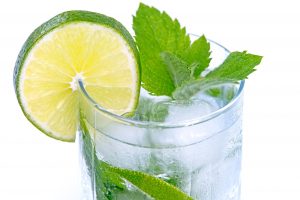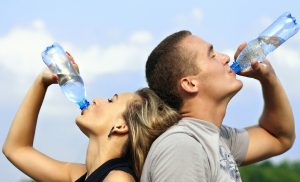What Is Electrolyte Water
Electrolyte water is a growing segment in the bottled water category. Examples of electrolyte waters include brands such as Propel, Smartwater, LIFEWTR, and Core Hydration. Some of these waters have added electrolytes to improve the taste and others are geared toward improved hydration.

So, just what is electrolyte water? These waters have added salts and minerals such as sodium, calcium, magnesium, and potassium. Many bottled waters and even tap water naturally contain trace amounts of these electrolytes. Electrolyte waters, however, have considerably higher amounts. Some brands may add a negligible amount to help improve the taste of the water, while others add a significant amount to market their waters to athletes and other health-conscious shoppers.
Why Your Body Needs Electrolytes
Electrolytes are minerals that conduct electricity when they are dissolved in water. The fluids in your body contain electrolytes that help your body function by providing electrical energy. You need electrolytes to control the balance of fluids in your body and to stabilize your blood pressure. They are also used for maintaining the proper pH of your blood and to help your muscles contract.
| Electrolyte | Function |
|---|---|
| Sodium | Responsible for controlling the amount of water in the body, regulating blood volume, and maintaining muscle and nerve function |
| Chloride | Works with sodium to maintain balance and pressure of body fluids |
| Calcium | Contributes to bone and tooth strength, helps transmit nerve impulses, and supports blood clotting and muscle function |
| Potassium | Regulates heartbeat and muscle function |
| Magnesium | Helps maintain nerve and muscle function, boosts immune system, maintains heart rate, stabilizes blood sugar, promotes healthy bones and teeth |
| Phosphate | Strengthens bones and teeth, essential for energy production in cells, necessary for tissue growth and repair, building block for cell membranes and DNA |
The Amount of Electrolytes in Water
Most waters that haven’t been filtered contain at least some naturally occurring electrolytes. On average, 34 ounces of tap water can provide between 2–3% of the Recommended Dietary Allowance (RDA) of calcium, sodium, and magnesium. The one important electrolyte that is not found in significant amounts in tap water is potassium. Electrolyte waters provide a much higher percentage of the RDA for these minerals.
Make Your Own Electrolyte Water
While the grocery store shelves are packed with a variety of electrolyte waters to choose from in flavors from strawberry kiwi to chocolate mint, you can easily make your own electrolyte water for a fraction of the cost. All you need are four ingredients that you probably already have on hand: water, sweetener sea salt, and baking soda.
- 1 liter water
- 1/2 tsp baking soda
- 2 tbsp sweetener (honey, sugar, maple syrup, or agave nectar)
- 1/2 tbsp sea salt
Combine all ingredients in a water bottle and shake until well mixed. For added potassium, you can add some citrus juice or coconut water. Unlike bottled electrolyte water that you would find in a store, this recipe gives you a refreshing boost of electrolytes without any artificial flavoring or colors.

When making your own electrolyte water, be sure to test your water to make sure you are putting the best water you can in your body. You can quickly and easily test your water with a test kit from TestAssured. Whether you are drinking tap water, filtered water, or bottled water, you cannot take for granted the quality of your water.
Benefits of Electrolyte Water
Proper hydration is an important component of good health and athletic performance. Electrolyte-enhanced waters, can help athletes quickly rehydrate and replenish electrolytes and energy lost through sweating during intense exercise.

Electrolyte water can also be helpful when you aren’t feeling well. Illnesses that are accompanied by vomiting and diarrhea can lead to dehydration if fluids and electrolytes are not replaced. Infants and children are especially vulnerable to dehydration when they are sick.

Electrolyte water is especially popular in hot environments. If you live in an area that experiences extremely high temperatures or high humidity, such as Arizona or Florida, you could be at risk for heat-related illnesses, including mild heat rash to life-threatening heatstroke. Maintaining proper hydration and electrolyte levels is key to helping your body stay cool and regulate its temperature.

Regular Water Compared to Electrolyte water
Staying hydrated is a necessary part of maintaining your overall health. Your body needs water and electrolytes to function properly and perform tasks like transporting nutrients, flushing out waste and toxins, and regulating body temperature.
The electrolyte water manufacturers tout their products as being superior to regular water. Yes, they have more electrolytes, but whether or not electrolyte water is better for you depends on the situation. Electrolyte water may be a better choice if you are at risk of losing minerals. This would include people who are exercising strenuously, sweating excessively, are ill with vomiting or diarrhea, or exposed to long periods of high heat and humidity.
The Bottom Line
Electrolyte water is a simple way to supplement minerals your body can easily lose. Remember, your body needs minerals like potassium, sodium, and magnesium to function properly. Drinking electrolyte water is an easy way to replenish those minerals to prevent dehydration.

